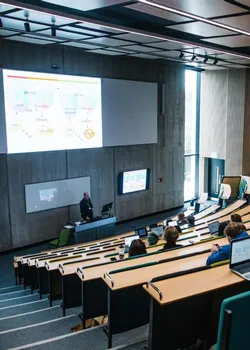Departmental news
Giant phage holds promise as treatment for lung infections, Warwick researchers find
Dr Jessica Lewis, from the Sagona Lab, has discovered a new bacterial killer that can target common lung infection caused by Burkholderia bacteria that has exciting potential for biotechnological applications.
Press release (3 April 2024)
£1.5m donation drives UK-Japan collaboration in antimicrobial research
A £1.5 million donation will drive joint research into antimicrobial resistance (AMR) by scientists in the UK and Japan.
Antimicrobial resistance poses a huge problem in healthcare, risking modern medicine becoming ineffective. This could lead to common infections becoming deadly illnesses. Now, thanks to visionary philanthropy from The Great Britain Sasakawa Foundation, which encourages innovative research between Japan and the UK, and The Sir Howard Dalton Centre at The University of Warwick, the research can progress at pace.
Press Release (6 March 2024)
My placement year in antimicrobial research
Emilie Cummerson, a Biomedical Science with Placement Year student, has just completed a year-long placement in the Sagona Lab and the university’s spinout company Cytecom. She describes her experience in an article for the Microbiologist.
Read the article.
Microbiologist of the Year
Chelsea Brown, a PhD student with Professor Phill Stansfeld and Dr Liz Fullam, won the Sir Howard Dalton Young Microbiologist of the Year for her talk entitled 'Modelling Mycobacterial Membranes: Anyone for PIMS?' at the 2023 Annual Microbiology conference. Chelsea presented her research to a panel of judges at the Microbiology Society Showcase on Tuesday 3 October 2023.
Historical medicine suggests a new way to use modern treatments
Combining honey and vinegar could be an old, yet new, way of treating persistent infections. The mixture of honey and vinegar, also known as oxymel, has been used as a medical treatment throughout history and now scientists have established that this combination could have modern applications in the treatment of wounds. New research by Dr Erin Connelly, Dr Freya Harrison and team, published in Microbiology, is the first comprehensive exploration of how the mixture could be applied to modern medicine and improve treatments for infections.
Press release (13 July 2023)
ENABLE workshop: Are the university learning environments as inclusive as we think?
 On Friday 29 September 2023, the School of Life Sciences will be hosting a free workshop: "Are the university learning environments as inclusive as we think? An investigation from the awarding perspective".
On Friday 29 September 2023, the School of Life Sciences will be hosting a free workshop: "Are the university learning environments as inclusive as we think? An investigation from the awarding perspective".
Based on a thorough data analysis from recent years and first-hand practical experience, the workshop will identify existing reasons for lack of inclusivity and unbiased awarding in biological science and related degree streams.
The workshop participants, comprising academic leaders, teaching professionals and a diverse student community, will also provide on consensus recommendations on how to close existing awarding gaps for a more inclusive learning and teaching environment throughout the UK.
Consensus recommendations will be published in a peer-reviewed journal.
New discovery stops bacterial virus contamination
A new discovery by Dr Antonia Sagona and colleagues could help stop bacteria being contaminated with viruses, reducing disruption and decreasing costs in industry and research.
Press Release (18 April 2023)
A “zinc” in the armour: could metal help combat common superbug?
A new study has shown that zinc plays a key role in a hospital superbug, that doctors struggle to treat due to its resistance to antibiotics.
Press Release (15 February 2023)
Bacteria communicate like us – and we could use this to help address antibiotic resistance
Like the neurons firing in human brains, bacteria use electricity to communicate and respond to environmental cues. Now, researchers have discovered a way to control this electrical signalling in bacteria, to better understand resistance to antibiotics.
In the study published in Advanced Science, Dr Munehiro and colleagues, report a major step forward in regulating bacterial electric signals with light.
Press Release (13 February 2023)
New study into Tuberculosis membrane molecules will aid drug delivery
 Chelsea Brown, a PhD student with Professor Phill Stansfeld and Dr Liz Fullam, has published a first author paper on tackling Tuberculosis (TB) by modelling mycobacterial membranes.
Chelsea Brown, a PhD student with Professor Phill Stansfeld and Dr Liz Fullam, has published a first author paper on tackling Tuberculosis (TB) by modelling mycobacterial membranes.
TB rivals covid-19 as the biggest infectious disease killer of humans, claiming millions of lives each year. Now, ground-breaking research from the Universities of Warwick and Toulouse has identified a new method to help tackle this global issue.
Press Release (30 January 2023)
